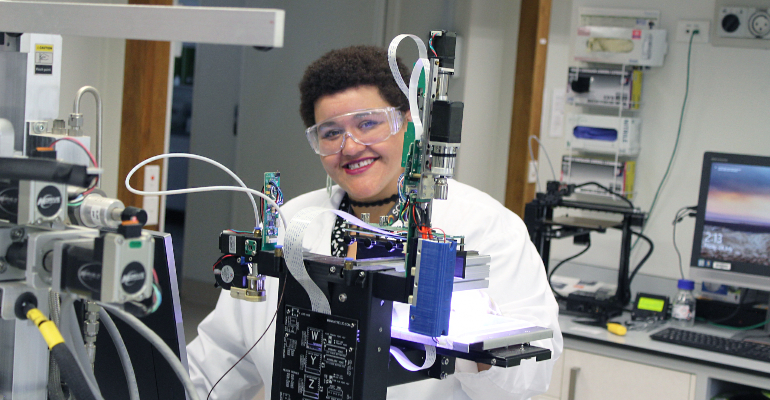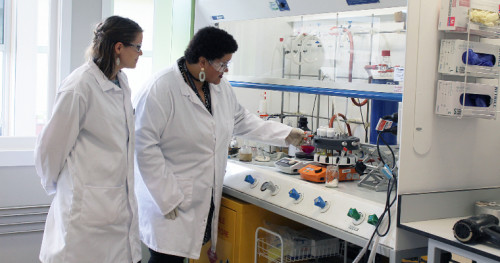
Dr Angelique Greene
Tiny sponges, huge potential impact for drinking water
Taking on Micro-pollutants: Have you ever worried about chemicals you might be ingesting on a daily basis?
Over recent years there has been growing concern around the trace amounts of contaminants found in our drinking water. These include pharmaceuticals, personal care products, steroid hormones, industrial chemicals, pesticides and many other emerging compounds and pose significant health risks to the people consuming them.
These nasties are termed micropollutants, and cannot be removed easily with conventional treatment processes. There are some known ways to remove them, however, they are expensive and energy-intensive.
SfTI Seed project researcher and chemist, Dr Angelique Greene is working hard on a solution to this global issue:
“I am passionate about water purification, and it’s an area with a huge amount of global interest at the moment. Micropollutants can disrupt bodily processes, which could lead to future health concerns.
"We have to drink water every day, and more and more we discover that we are ingesting these little guys and we don’t fully understand the impacts they’re having on our bodies.”
Cutting edge ‘soft robots’ that recognise and remove nasties
Based at Scion, Dr Greene received $198,888 of SfTI Seed project funding in 2019 under the Materials, Manufacturing Technology and Design theme for her idea, which demonstrates boundary pushing science in two fields, soft-actuators and chemical sequestration.
Dr Greene is developing small sponges with active bio-organic agents within them that could not only identify the trouble making chemicals, but attach to them and isolate them so they can be removed from the source. These smart little sponges made of jelly-like material expand to absorb the damaging chemicals and then ‘self-clean on command’ by contracting and ejecting the chemicals so they can be reused.

Dr Greene explains: “Here we have a reusable filter that can do chemical recognition. I call them soft robots or ‘gummy bears’, but they are potentially the first example of a soft-actuator being used for reversible chemical separations.”
“They could provide a solution for water purification by identifying and removing micropollutants and will be able to be used far longer than and with far more efficiency than existing filters. I see them as being part of industrial filtration systems, providing one part of a process that removes these dangerous compounds from our drinking water.”
A cheaper and more effective solution to a huge market need
Currently, chemical sequestration is costly and energy intensive and industries are looking for innovation in these areas to reduce costs and waste products generated in the process. Dr Greene’s research, if successful, could lead to a solution in hot demand in several sectors where chemical separation is required, for example the development of pharmaceuticals. Plus, New Zealand’s large farming and dairy sectors could benefit from novel research like Dr Greene’s, which offers a way to clean waste streams produced during processing and to recycle high-value waste stream products for economic benefit.
Dr Greene has decided that focussing on water purification gives her the biggest potential impact, in New Zealand and across the world.
“I’m currently finalising our first prototype and if it works it could potentially solve problems in several industries; but for me, focusing on filtering drinking water feels so right.
"Not only is it something I am passionate about, but it’s a global problem. It’s exciting to think about the positive impact and massive market there would be for this technology.”
Dr Angelique Greene is a Polymer Scientist based at Scion and specializing in the fabrication of hydrogels and organic soft materials and additive manufacturing, with a strong background in analytical separations, inorganic synthesis and electrochemistry.